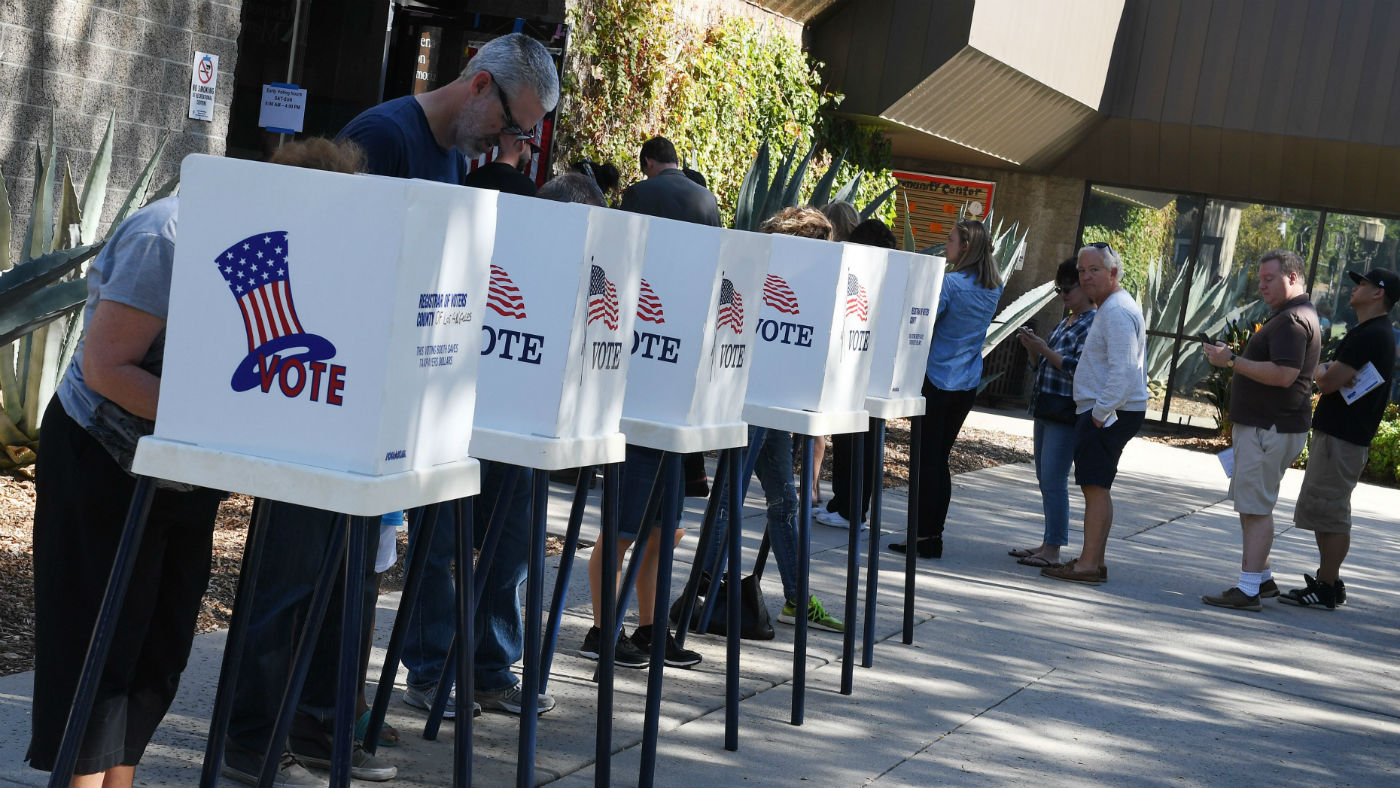How would compulsory voting affect the US midterms?
Today’s US congressional elections will be decided not by those who turn out to vote, but by those who stay away

A free daily email with the biggest news stories of the day – and the best features from TheWeek.com
You are now subscribed
Your newsletter sign-up was successful
If there is one thing that all Americans can agree on as they prepare to cast their ballots in today’s make-or-break mid-terms, it’s that this election matters.
Yet with so much at stake in a campaign that has smashed spending records, turnout is still only expected to be around 50% of the electorate.
So is compulsory voting the answer and how would it change the electoral map?
The Week
Escape your echo chamber. Get the facts behind the news, plus analysis from multiple perspectives.

Sign up for The Week's Free Newsletters
From our morning news briefing to a weekly Good News Newsletter, get the best of The Week delivered directly to your inbox.
From our morning news briefing to a weekly Good News Newsletter, get the best of The Week delivered directly to your inbox.
“Non-voters can be seen as the deserters of democracy; or, from another point of view, the conscientious objectors. Alternatively, their absence could be diagnosed as a form of exclusion – a deliberate attempt to keep the ‘wrong people’ out of the political process,” writes Peter Franklin on UnHerd.
This latter view is especially prevalent on the left of politics, not least because non-voters in the US are disproportionately young, low-paid and non-white.
Aware of this, former president Barack Obama has made getting out the vote central to his stump speech.
Speaking on his former speechwriter's podcast last month, Obama said:
A free daily email with the biggest news stories of the day – and the best features from TheWeek.com
“This isn’t really a 50-50 country. It’s like a 60-40 country. Democrats could and will do even better if every one of your listeners not only votes but makes sure that all your wishy-washy, excuse-making, internet-surfing, TV-watching, grumbling-but-not-doing-nothing friends and family members get to the polls.”
Emily Badger in the New York Times writes that “many political scientists say that policies that make voting easier would also make American democracy more representative and less likely to favour the interests of wealthier, older and white voters who typically turn out at higher rates”.
In Australia, where voting has been mandatory since 1924, The Age says “conservatives would love to make voting non-compulsory, being certain that only their base voters would be certain to vote, and would be easier to mobilise with 'dog-whistle' campaigns such as religious 'freedom'.”
“I’m not comfortable recommending any kind of compulsion,” Tim Montgomerie wrote in The Times back in 2015. “But I’m much more uncomfortable at the prospect of Britain becoming some sort of gerontocracy where older (and richer) people decide who is in power. This is a much greater social evil.”
The figures bear the view that non-compulsory voting favours conservatives out. Re-running the 2016 US presidential election assuming everyone polled voted, Badger found Clinton would have taken the White House by winning swing states such as Texas, North Caroline and Florida that ultimately went to Donald Trump.
In the UK, habitual non-voters had a key role in the shock results of the Brexit referendum and the 2017 general elections.
In the final days of the mid-term campaign, much has been made of alleged instances of voter suppression. However, those excluded from voting represent a drop in the ocean compared to the millions who either by choice or apathy don’t make it to the polls.
“Far from being non-participants in our democracy, non-voters are a crucial component – a psephological Sword of Damocles, hanging over the political establishment”, says Franklin.
-
 What are the best investments for beginners?
What are the best investments for beginners?The Explainer Stocks and ETFs and bonds, oh my
-
 What to know before filing your own taxes for the first time
What to know before filing your own taxes for the first timethe explainer Tackle this financial milestone with confidence
-
 The biggest box office flops of the 21st century
The biggest box office flops of the 21st centuryin depth Unnecessary remakes and turgid, expensive CGI-fests highlight this list of these most notorious box-office losers
-
 Trump’s EPA kills legal basis for federal climate policy
Trump’s EPA kills legal basis for federal climate policySpeed Read The government’s authority to regulate several planet-warming pollutants has been repealed
-
 House votes to end Trump’s Canada tariffs
House votes to end Trump’s Canada tariffsSpeed Read Six Republicans joined with Democrats to repeal the president’s tariffs
-
 Bondi, Democrats clash over Epstein in hearing
Bondi, Democrats clash over Epstein in hearingSpeed Read Attorney General Pam Bondi ignored survivors of convicted sex offender Jeffrey Epstein and demanded that Democrats apologize to Trump
-
 How corrupt is the UK?
How corrupt is the UK?The Explainer Decline in standards ‘risks becoming a defining feature of our political culture’ as Britain falls to lowest ever score on global index
-
 Judge blocks Trump suit for Michigan voter rolls
Judge blocks Trump suit for Michigan voter rollsSpeed Read A Trump-appointed federal judge rejected the administration’s demand for voters’ personal data
-
 US to send 200 troops to Nigeria to train army
US to send 200 troops to Nigeria to train armySpeed Read Trump has accused the West African government of failing to protect Christians from terrorist attacks
-
 Grand jury rejects charging 6 Democrats for ‘orders’ video
Grand jury rejects charging 6 Democrats for ‘orders’ videoSpeed Read The jury refused to indict Democratic lawmakers for a video in which they urged military members to resist illegal orders
-
 Trump links funding to name on Penn Station
Trump links funding to name on Penn StationSpeed Read Trump “can restart the funding with a snap of his fingers,” a Schumer insider said